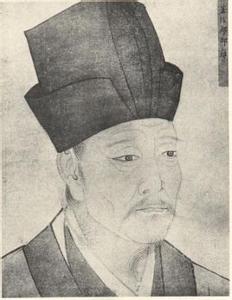(单词翻译:单击)
Shao Yung (1011~1077) was a Chinese philosopher who greatly influenced the development of the idealist school of neo-Confucianism.
绍雍(1011~1077),哲学家,对唯心主义新儒学的发展有很大的影响。
Shao Yung's mathematical ideas also influenced the 18th-century European philosopher Gottfried Wilhelm Leibniz in the development of a binary arithmetical system—i. e., one based on only two digits.
绍雍的数学思想在二进制的发展方面也影响了is世纪欧洲哲学家哥特弗里德·威尔海姆·莱布尼兹。

Originally a Taoist, Shao refused all offers of government office, preferring to while away the hours in a humble hermitage outside Henan, conversing with friends and engaging in mystical speculation.
最初绍雍信仰道家学说,拒绝当官,宁愿住在河南之外一个偏远朴实的寺院里,通过朋友交谈以及做一些神秘的思索来消磨时光。
He became interested in Confucianism through his study of the great Confucian Classic and work of divination, the Yi Ching (“Classic of Changes"). Through the Yi Ching, Shao developed his theories that numbers are the basis of all existence. To him, the spirit that underlies all things could be comprehended if one understood the division of the different elements into numbers.
绍雍通过研究儒家经典和预言书《易经》对儒学产生了兴趣。通过《易经》,绍雍发展了一切存在均建基于数字的理论对绍雍而言,如果能理解不同元素分成数字的方法,那么决定一切事物的精神就可以理解了。
But unlike most previous Chinese numerologists, who usually preferred the numbers two or five, Shao believed the key to the world hinged on the number four; thus the universe is divided into four sections (Sun, Moon, stars, and zodiac), the body into four sense organs (eye, ear, nose, and mouth), and the Earth into four substances (fire, water, earth, and stone).
但是不像中国原来大多数数字命理学家更喜欢二或五那样,绍雍认为世界的关键在于四。所以宇宙分为四个部分(太阳、月亮、星星和黄道带),身体分四个感官(眼、耳、鼻、口),地球分为四种物质(水、火、土、石)。
In a similar way, all ideas have four manifestations, all actions four choices, and so forth.
以此类推:所有的思想都有四种表现,所有的行动都有四个选择等等。
Although this complicated system was outside the basic concerns of Confucianism and exercised only a peripheral influence on the development of Chinese thought, what was important was the basic theory behind the system: there is an underlying unity to existence, which can be grasped by the superior man who understands its basic principles.
尽管这一复杂体系不在儒学关注之内,并且对中国思想的发展影响也不大,但是这一体系背后的理论是很重要的:任何存在背后都有决定因素,而能够理解存在的基本原理的高人是可以掌握存在的。
The idea that the underlying principle behind the unity of the universe exists in man's mind as much as in the universe was the basis of the idealist school of neo-Confucianism.
万物背后的决定原理不但存在于万物中,也存在于人脑中,这一思想就是唯心主义宋明理学的基础。
Moreover, Shao brought into Confucianism the Buddhist idea that history consists of series of repeating cycles. These cycles, known to Buddhists as kalpas, were called yüan by Shao and reduced from an astronomical length to a comprehensible duration of 129,600 years.
而且绍雍还把佛教的循环学说融入了儒学里,他将佛教叫做劫的这些循环叫做缘,井且把庞大得无法估计的长度缩减至人们可以理解的129,600年。
This theory was later accepted by all branches of neo-Confucianism and made part of the official state ideology by the 12th-century Song scholar Zhu Xi.
这一理论后来被宋明理学的各个分支接受,并且被12世纪宋代学者朱熹发展成国家官方思想意识的一部分。


